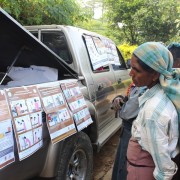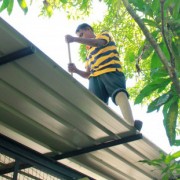Speeches Shim

In early 2018, Sri Lanka — an island nation off India’s southern tip — watched in anticipation as the results of the first local government elections since an historic mandate was approved the year before requiring 25 percent of locally-elected government officials be women.
The result: a changed political landscape with nearly 2,000 women elected to local council seats, taking an impressive 23 percent of local elected seats compared to the less than 2 percent of seats they held just a few years ago.

Forty-five-year-old P.W.R. Palipana’s dreams crumbled before his eyes just like the bicycle he was riding when a lorry collided with him on his way home from work in the central hills of Sri Lanka. A mason by profession and the sole breadwinner of a family of five, he agonized about his lost leg, livelihood and mobility. That was in 2007.
A mason by profession and the sole breadwinner of a family of five, he agonized about his lost leg, livelihood and mobility. That was in 2007. Ten years later his life is back on track, both professionally and personally, since he braved the steep climb to one of Sri Lanka’s tallest mountains without any assistance. “This shows that the artificial foot I am wearing is hard, durable and is able to cope with any distance and hard terrain. It is also far more flexible, lighter and comfortable than the pieces I used before,” says Palipana.
In 2009, 20 years after fleeing the conflict between Sri Lanka and the separatist Tamil Tigers, 59-year-old Subramaniam Yogadas and his family returned to his coastal village in the Eastern district of Trincomalee. They had been refugees in India and the end of the conflict allowed them to rejoin their few surviving relatives.
Amaranthé Bay, a small luxury hotel poised between a lagoon and the sea, offered a bright new beginning for him and his family of six, which includes a disabled child. Yogadas was the hotel’s first employee. Amaranthé Bay’s goal was to develop the property to offer employment and training opportunities to the conflict-affected and impoverished local community. For the majority of the hotel’s 70 staff, including war widows who resettled after the conflict, Amaranthé Bay offered a second chance to live.

Comment
Make a general inquiry or suggest an improvement.